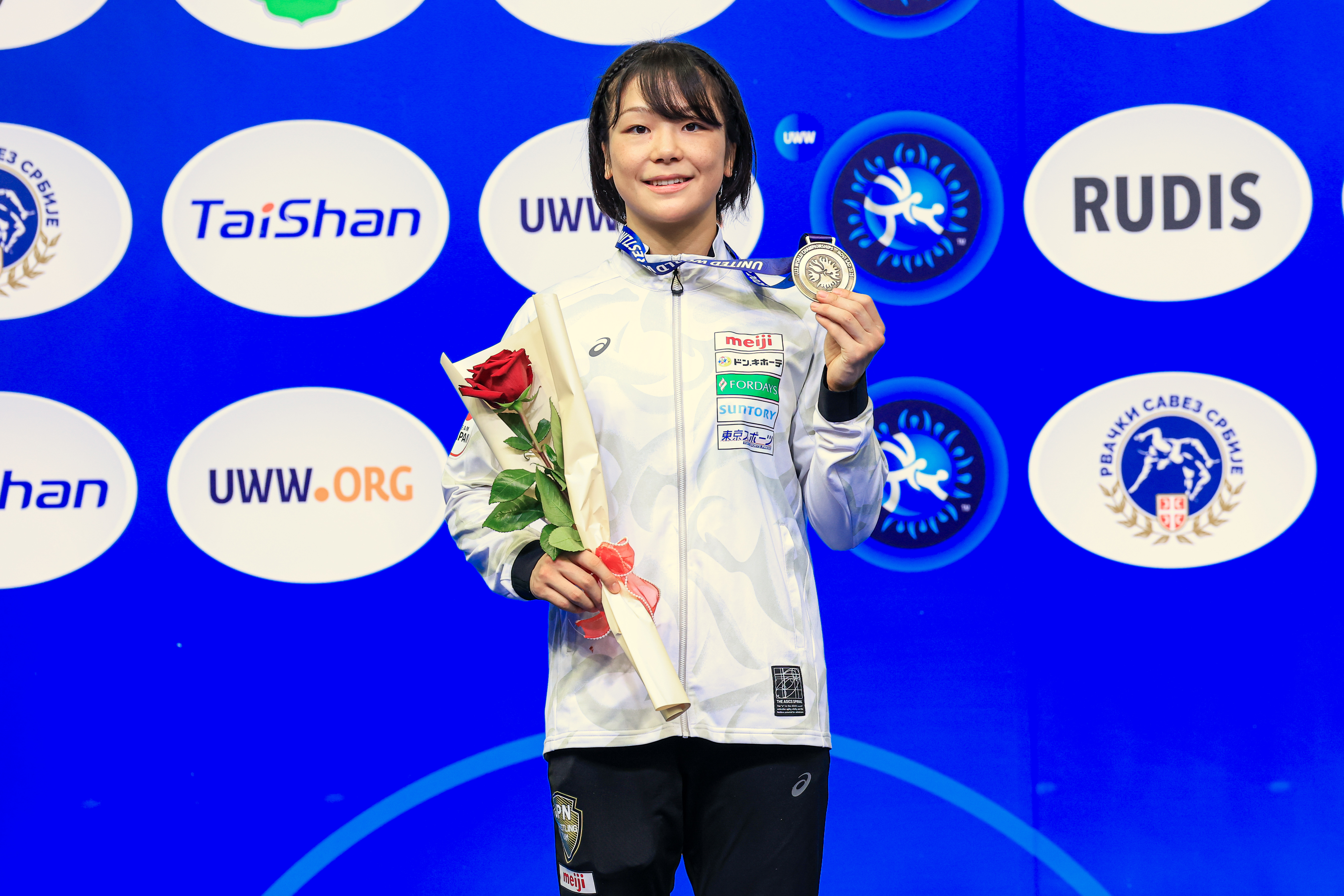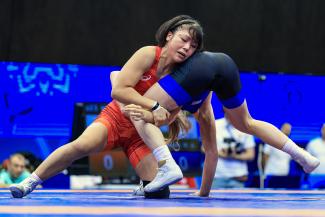NOVI SAD, Serbia (October 24) -- Akari FUJINAMI (JPN) said she was 'a little nervous' before coming to Novi Sad for her first international tournament at 57kg.
On the mat, however, the Paris Olympic champion showed no signs of nerves.
Fujinami won her first U23 world title, extended her win streak to 145 matches dating back to 2017 and made a golden debut at the new weight class. Even more remarkable was the manner in which she won her all bouts, via technical superiority.
"It was my first match in a long time," Fujinami said. "I think it was a tournament where I was able to show my skills I had practiced, feeling relieved and have fun playing in the competition."
In the 57kg final, it took Fujinami only five second to hit that outside single against Aryna DZEMCHANKA MARTYNAVA (UWW) and score the first takedown. Another similar attack and she was up 4-0. A go-behind made it 6-0 and a transitioned double-leg attack gave her four points as she won 10-0.
"I could feel the power of my opponents in the new weight class," Fujinami said. "I still had to reduce weight but I feel that I moved very well on the mat.
"As for the final, when it comes to handling when (my) head is outside, foreign players are strong [in dealing with that], so I have honed my skills a lot. It's a move that doesn't let the opponent get together, or to tackle."
Fujinami, who won the Japan's Queens Cup in April to qualify for the U23 World Championships, decided to skip the Meiji Cup and in turn the World Championships in Zagreb, as she would not be ready physically for the challenge.
The U23 Worlds, however, laid a perfect platform for her to test herself as she gears up for the all-important Emperor's Cup in December. In Novi Sad, she spent a total of 8:22 on the mat in four bouts with little trouble.
"I wasn't aware of it at all," she said about winning every bout via technical superiority. "I thought I was just doing what I had been doing. This time, I was practicing not only tackles but also snaps. It's a move like Masanosuke ONO, who dropped his opponent down. I want to practice more and more and make it a technique that can score."
 Akari FUJINAMI (JPN) won the gold medal at 57kg at the U23 World Championships. (Photo: United World Wrestling / Amirreza Aliasgari)
Akari FUJINAMI (JPN) won the gold medal at 57kg at the U23 World Championships. (Photo: United World Wrestling / Amirreza Aliasgari)
The competition at Emperor's Cup, which Fujinami wants to win in order to compete at the Aichi-Nagoya Asian Games in 2026, will be much tougher. Apart from the regulars at 57kg including Sara NATAMI (JPN), Himeka TOKUHARA (JPN) and Sowaka UCHIDA (JPN), a possible return of fellow Paris Olympic champion Tsugumi SAKURAI (JPN), may spice up the competition.
Fujinami also has eyes on the 2028 Los Angeles Olympics and in particular wrestling one wrestler -- Helen MAROULIS (USA).
"I respect Helen Maroulis a lot," she said. "But now I am at 57kg and I must beat her."
In other women's wrestling finals on Friday, Kazakhstan got its first-ever U23 world champion in women's wrestling after Shugyla OMIRBEK (KAZ) held on to a thrilling win against Tuba DEMIR (TUR) at 55kg.
Omirbek got a takedown to start the final as Demir was put on the activity clock. She then turned Demir three times using an underhook from behind and stretching the other arm of Demir for exposure. As the sequence finished, Omirbek was up 9-0.
Demir made a match out of it when she hit a slick ankle pick and landed Omirbek in danger for four points which she got after a challenge. A double-leg attack gave her two more points to make it 9-6.
The dramatic part of the final began now as Demir added another takedown to cut the lead to one point, 9-8, before exposing Omirbek for danger but the referees scored it as neutral as the Kazakhstan wrestler may not been have in danger position.
Not disheartened by the decision, Demir launched another attacked and almost got the stepout with 15 seconds left. However, the referees called it par terre position for both wrestlers and no points were given. Turkiye decided to challenge this time only to lose it and give a 10-8 lead to Omirbek.
After Demir missed her desperate shot, Omirbek circled and got behind to get two more points before bursting into a celebration with her coaches.
Turkiye's gloomy mood changed a little when Nesrin BAS (TUR) won her third U23 world title at 68kg in a dominant fashion. Bas now has three golds and one silver U23 Worlds.
The European and world silver medalist was facing Alina SHEVCHENKO (UWW) in the final and at no point she seemed in any danger of losing her title. She began with a single leg for takedown before a fireman's carry added two more point to her score.
It was way to simple from there on as Bas used a low single, go-behind and elevated leg takedown to finish the match 10-0. She joins Haruna OKUNO (JPN) and Alenxadrin GUTU (MDA) as three-time U23 world champions.
At 65kg, Elizaveta PETLIAKOVA (UWW) pinned Yuqi RAO (CHN) in the final using a fireman's carry and finishing the bout in just a minute and four seconds to win the gold medal.
RESULTS
55kg
GOLD: Shugyla OMIRBEK (KAZ) df. Tuba DEMIR (TUR), 12-8
BRONZE: NISHU (IND) df. Albina RILLIA (UKR), 3-1
BRONZE: Amory ANDRICH (GER) df. Mihaela SAMOIL (MDA), 10-5
57kg
GOLD: Akari FUJINAMI (JPN) df. Aryna DZEMCHANKA MARTYNAVA (UWW), 10-0
BRONZE: Neha SHARMA (IND) df. Roza SZENTTAMASI (HUN), 5-0
BRONZE: Yaynelis SANZ VERDECIA (CUB) df. Emine CAKMAK (TUR), 6-4
65kg
GOLD: Elizaveta PETLIAKOVA (UWW) df. Yuqi RAO (CHN), via fall (4-0)
BRONZE: PULKIT (IND) df. Eniko ELEKES (HUN), 8-4
BRONZE: Oleksandra RYBAK (UKR) df. Mukhayyo NARZILLOEVA (UZB), 10-0
68kg
GOLD: Nesrin BAS (TUR) df. Alina SHEVCHENKO (UWW), 10-0
BRONZE: Gulnura TASHTANBEKOVA (KGZ) df. Gerda BARTH (GER), 4-2
BRONZE: SRISHTI (IND) df. Karolina POK (HUN), 6-1
Women's Wrestling Semifinal
53kg
GOLD: Haruna MORIKAWA (JPN) vs. Hansika LAMBA (IND)
SF 1: Haruna MORIKAWA (JPN) df. Christianah OGUNSANYA (NGR), 5-2
SF 2: Hansika LAMBA (IND) df. Carla JAUME SOLER (ESP), 11-0
59kg
GOLD: Ruka NATAMI (JPN) vs. SARIKA (IND)
SF 1: Ruka NATAMI (JPN) df. Hiunai HURBANOVA (AZE), 3-1
SF 2: SARIKA (IND) df. Olha PADOSHYK (POL), 12-6
62kg
GOLD: Sakura MOTOKI (JPN) vs. Iryna BONDAR (UKR)
SF 1: Sakura MOTOKI (JPN) df. Immacolata DANISE (ITA), via fall
SF 2: Iryna BONDAR (UKR) df. Astrid MONTERO CHIRINOS (VEN), 8-5
Freestyle Semifinal
74kg
GOLD: Halit OZMUS (TUR) vs. Mitchell MESENBRINK (USA)
SF 1: Halit OZMUS (TUR) df. Magomed KHANIEV (AZE), 7-3
SF 2: Mitchell MESENBRINK (USA) df. Yoshinosuke AOYAGI (JPN), 7-4
92kg
GOLD: Mukhamed KHANIEV (UWW) vs. Mobin AZIMI (IRI)
SF 1: Mukhamed KHANIEV (UWW) df. Ion DEMIAN (MDA), 12-1
SF 2: Mobin AZIMI (IRI) df. Ivan CHORNOHUZ (UKR), 12-1


 Akari FUJINAMI (JPN) won the gold medal at 57kg at the U23 World Championships. (Photo: United World Wrestling / Amirreza Aliasgari)
Akari FUJINAMI (JPN) won the gold medal at 57kg at the U23 World Championships. (Photo: United World Wrestling / Amirreza Aliasgari)
Share your thoughts.
Comments